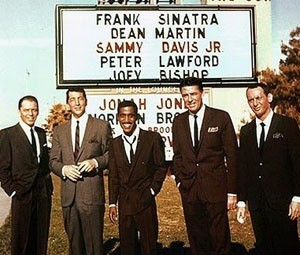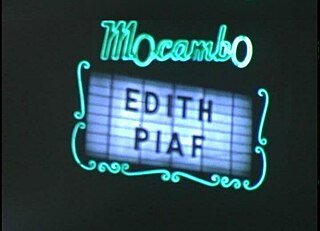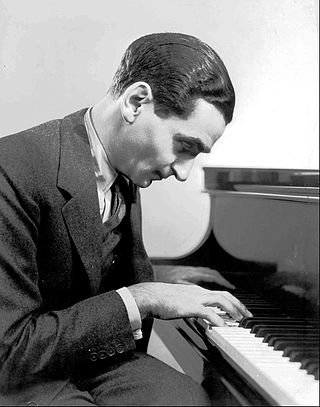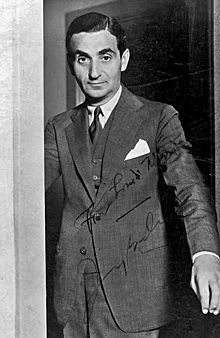
Irving Berlin was an American composer and songwriter. His music forms a large part of the Great American Songbook. Berlin received numerous honors including an Academy Award, a Grammy Award, and a Tony Award. He also received the Presidential Medal of Freedom from President Gerald R. Ford in 1977. Broadcast journalist Walter Cronkite stated he "helped write the story of this country, capturing the best of who we are and the dreams that shape our lives".
Traditional pop is Western pop music that generally pre-dates the advent of rock and roll in the mid-1950s. The most popular and enduring songs from this era of music are known as pop standards or American standards. The works of these songwriters and composers are usually considered part of the canon known as the "Great American Songbook". More generally, the term "standard" can be applied to any popular song that has become very widely known within mainstream culture and recorded by many artists.

The Rat Pack was an informal group of singers that, in its second iteration, ultimately made films and appeared together in Las Vegas casino venues. They originated in the late 1940s and early 1950s as a group of A-list show business friends, such as Errol Flynn, Nat King Cole, Mickey Rooney, Judy Garland, Frank Sinatra and others who met casually at the Holmby Hills home of Humphrey Bogart and Lauren Bacall. In the 1960s, the group featured Sinatra, Dean Martin, Sammy Davis Jr., Joey Bishop, and Peter Lawford, among others. They appeared together on stage and in films in the 1950s and 1960s, including the films Ocean's 11 and Sergeants 3; after Lawford's expulsion, they filmed Robin and the 7 Hoods with Bing Crosby in what was to have been Lawford's role. Sinatra, Martin, and Davis were regarded as the group's lead members after Bogart's death.

The Mocambo was a nightclub in West Hollywood, California, at 8588 Sunset Boulevard on the Sunset Strip. It was owned by Charlie Morrison and Felix Young.

"One for My Baby (and One More for the Road)" is a song written by Harold Arlen and Johnny Mercer for the movie musical The Sky's the Limit (1943) and first performed in the film by Fred Astaire.
"Oh, What a Beautiful Mornin'" is the opening song from the musical Oklahoma!, which premiered on Broadway in 1943. It was written by composer Richard Rodgers and lyricist/librettist Oscar Hammerstein II. The leading male character in Oklahoma!, Curly McLain, sings the song at the beginning of the first scene of the musical. The refrain runs: "Oh, what a beautiful mornin'! / Oh, what a beautiful day! / I've got a beautiful feelin' / Ev'rythin's goin' my way." Curly's "brimming optimism is perfectly captured by Rodgers' ebullient music and Hammerstein's buoyant pastoral lyrics."

Trilogy: Past Present Future is the fifty-fifth studio album by American singer Frank Sinatra, released in March 1980 through Reprise. The triple album included his last Top 40 hit: "Theme from New York, New York".
"You're Just in Love" is a popular song by Irving Berlin. It was published in 1950 and was first performed by Ethel Merman and Russell Nype in Call Me Madam, a musical comedy that made its debut at the Imperial Theatre in New York City on October 12 that year. The show ran for 644 performances. Ethel Merman also later starred in the 1953 film version, with Donald O'Connor.
"The Gypsy in My Soul" is a popular song written for the 50th anniversary of the University of Pennsylvania Mask and Wig show in 1937 by two Penn graduates, Clay Boland and Moe Jaffe. Boland wrote the music and Jaffe the lyrics. Although both men had long since graduated, it had become the practice at the time for professionals, rather than students, to compose songs for the show.

"You'd Be Surprised" is a song written by Irving Berlin in 1919 which Eddie Cantor interpolated it into Ziegfeld's Follies of 1919. Cantor soon recorded it and it became a major hit. Other popular versions in 1920 were by the All-Star Trio and by Irving Kaufman.
"I'll Be Around" is a popular song written by Alec Wilder and published in 1942. It was first recorded by Cab Calloway and his Orchestra in 1942 and the first hit version was by The Mills Brothers in 1943 when it reached No. 17 in the Billboard pop charts. The song has become a well-known standard, recorded by many artists.
Lew Spence was an American songwriter.

The Copa Room was an entertainment nightclub showroom at the now-defunct Sands Hotel on The Las Vegas Strip in Las Vegas, Nevada. It was demolished in 1996 when the Sands Hotel was imploded.

William Otto Harbach was an American television producer, director and author. He won four Emmy Awards and a Peabody Award Harbach also produced and directed special events, including eight ASCAP celebrations for renowned composers, lyricists and librettists. He was the son of American lyricist, librettist and ASCAP co-founder Otto Abels Harbach.
"We'll Be Together Again" is a 1945 popular song composed by Carl T. Fischer, with lyrics by Frankie Laine.

"I'm Glad There Is You (In This World of Ordinary People)" is a song written by Jimmy Dorsey and Paul Madeira (sometimes credited as Paul Mertz) first published in 1941. It has become a jazz and pop standard.
"The Second Time Around" is a song with words by Sammy Cahn and music by Jimmy Van Heusen. It was introduced in the 1960 film High Time, sung by Bing Crosby with Henry Mancini conducting his orchestra, and was nominated for the Academy Award for Best Original Song. It lost out to "Never on Sunday".

Christmas with Sinatra & Friends is a 2009 compilation album by Frank Sinatra.

"My Twelve Tone Melody" is a 1988 composition by Leonard Bernstein written in tribute to Irving Berlin in celebration of Berlin's 100th birthday. It was performed by Bernstein at the concert to celebrate Berlin's birthday at Carnegie Hall in May 1988.











